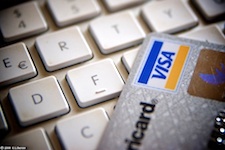Ever since the financial crisis in 2008, and the resultant recession, there has been a renewed interest in canceling credit cards and getting out of debt. Additionally, the upswing in fees from many credit card issuers has prompted some to want to cancel credit cards in order to avoid those fees. Many card issuers are instituting annual fees, leading even the most responsible and conscientious card users to feel the costs of credit card spending.
However, just because it’s tempting to cancel your credit card, doesn’t mean it’s always a good idea. Before you cancel your card, consider the effect that a cancellation could have on your credit score.
How Canceling a Credit Card Affects Your Credit Score
The point of your credit score is to measure how you use credit. The entire system is set up to encourage credit card use. So, when you cancel your credit card, you could be penalized. It is important to understand this before you make your move. Some of the ways that a canceled credit card affects your credit score include:

- Length of credit history: After your debt to available balance ratio, the next important factor is the length of your credit history. Your score considers the average amount all of your credit accounts have been open. If you cancel a credit card, especially one that you have had for a long time, you bring down the average.
- Credit types: It’s not a terribly important factor in your score, but it does have an impact — the types of credit you have matter. You do better, in terms of credit score, if you have a mix of revolving and installment accounts. If you cancel a card that represents one of a limited number of revolving accounts, that can be damaging. Also, a major card issuer “counts” for more than a department store card. Keep that in mind before you cancel a card.
When Is the Best Time to Cancel a Credit Card?
The best time to cancel a credit card is when you aren’t planning to apply for new credit. If you know you won’t be applying for a home loan or a car loan anytime within the next six to nine months, it might be worth it to cancel a card. It can also help to wait to cancel until you have paid down a little more of your debt. If you have most of your debt paid off, canceling one card, and still having available credit elsewhere, can help cushion your credit score. Of course, after a few months, your credit score will recover.
When deciding which card to cancel, try to choose one that will have minimal impact. A card with a lower limit, and one that hasn’t been opened too long is idea. However, if you are closing an account because of new, higher fees, those considerations may not matter so much. Maintaining a slightly higher score probably isn’t worth the fees you are paying.
Good post. This is one of those quirky things about credit scoring that most people don’t know.
Lowering your score a little bit by canceling a score might not be terrible depending on someone’s situation. If you’re trying to get a mortgage in the next couple months, I’d say wait to close your cards.
But if you’re not planning to buy a house or do anything else major in the near future, taking the hit to your score might be just fine. It will come back up. And if you need to close a card to keep temptation from causing you bigger problems, it might be the best decision.
To have a good score one MUST have debt. One must have Credit Cards/Lines. So everyone is focused on the score and not on getting out of debt. What we have is: one could have tons of money in the bank, have a great income but would have a bad score because not having credit.
You’re right that you must have credit lines to get a score (two active ones at least). But you don’t have to have long term debt. You can pay a single credit card off each month and still have it build your score.
And making larger payments on installment loans instead of just the minimum is another way you can move toward being debt-free while improving your score.
This is good information and something to think about even though I would be most people don’t. I have been reluctant to cancel any cards at this time because some of them have been decreasing credit which has the same effect by default.
I know this is important, however I never worried about it. I have a 40+ year history, no debt except a small mortgage and a very high credit score.
Interesting post, especially since I’m trying not to incur anymore debt, I thought about cancelling some of my cards, but I decided not to.I’m just going to pay them off as soon as I can.
Thanks for the sharing this information. I think slowly canceling lower quality credit cards (for company stores for example) is worth it. Or those with annual fees that you no longer use.
I would like to now, I was planning to close BoA loan de credit line was ove 30k, they say was gold option, i had 2000 from the original amout, and i was told I can not use anymore the credit line I have, cand you tell me if I pay off and i close the account will be hurt mi fico score , due to the credit limit..
thanks